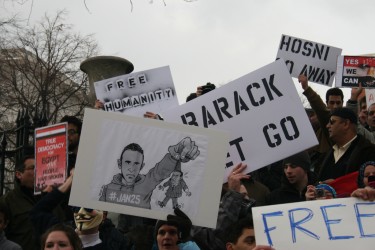While the official US response to the protests in Egypt is a desperate hope for stability, lesser televised American voices are supporting the protesters in the land of the pyramids.
Human Rights Now, the blog of Amnesty International USA, has a post by one of its Middle East country specialists, Geoffrey Mock, who sees a specific American connection in the developments:
News that after five days of protests Omar Suleiman has been named vice president of Egypt is a reminder that the abuses that drove the people into the streets there had too much assistance from America, including right here in my home of North Carolina.
According to journalist Stephen Grey, Suleiman was the Egyptian conduit for the US extraordinary rendition flights closely linked to torture.
[…]
I was also reminded of the Johnston County flights when I received reports this week from people in Cairo of the tear gas canisters being used against them. Made in the USA, the canisters said.
When you are watching the footage of the Egyptian people in the street, showing their frustration of 30 years of tyranny and abuse, it’s safe and appropriate to feel solidarity with them. But it’s not enough. To support the people in Cairo trying to change those abuses, we in the US and in North Carolina must end our own policies and acts that have sustained them.
Demonstrators singing the Egyptian anthem in New York by the United Nations; video by blogger Ahmed Al Omran of Saudi Arabia, aka “Saudi Jeans,” currently a student in New York.
In another post calling for action, Mock lists a number of events organized in the US: “Demonstrations have already been held in San Francisco, New York and DC,” he writes, adding that Amnesty International USA organized a rally outside the Egyptian consulate in Chicago on Saturday, January 29.

A demonstration in Boston in support of Egyptian protests. Photo by Jillian C. York on Flickr (Creative Commons Attribution-NonCommercial-ShareAlike)
Rana Rizk, a native of Egypt's capital Cairo, joined her compatriots’ protests from New York. She writes in The Huffington Post:
I have been on the phone with my family in Egypt getting eyewitness reports from what they see out their window, very close to Tahrir square and I am reporting back international news I see online, since the Internet was and still remains cut off. They are completely isolated. I am writing before I go to sleep in New York City in commemoration and thought of all those who were injured today, arrested, or even killed. Of course, Egypt was a black hole today with no light coming out. I am scared to find out what happened to our courageous protesters today.
[…]
Contrary to what I always believed, non-violent demonstration in the Middle East is possible and deserves great respect. Their demands must be answered and encouraged by the international community. And please, I say to the U.S. stop selling tear bombs to the Egyptian government. How can you encourage Mubarak to listen to the pleads of protesters and in the same breathe provide them with ammunition to harm those very same protesters?
Vermont lawyer Jack McCullough worries for the future of Egypt's democracy in his blog Rational Resistance:
I have the feeling I've seen this movie before. A dictator who is largely friendly to the United States and its foreign policy goals is in trouble, shaken by massive street demonstrations.
It's not quite the same as Iran, because in this case the dictator wasn't installed by the United States. Still, things are not looking too stable for Hosni Mubarak.
[…]
It's almost impossible not to identify with the demonstrators in the street, to say, as a friend of mine just observed, we are all Egyptians now.
If you're old enough you remember the same feeling watching the students in Tehran, risking murder by Pahlavi's SAVAK. I sure did. In fact, when I was in law school I had the chance to represent an Iranian student who was arrested on campus at the University of Michigan for wearing a mask at an anti-Pahlavi demonstration.
[…]
Is there any chance that Mubarak can be escorted out without creating and Iranian-style Islamic dictatorship?
Geoffrey Mock, quoted earlier, has a response. “This was a protest that crossed class, ideology and religion, and that is what scares the government.”







1 comment
I tender heartfelt support for the people of TAHRIR SQUARE. You have shown enormous courage and conviction in your stance. The world is watching and we are with you in spirit.
May your resolve not waiver!